India Thriving in the Global Arena
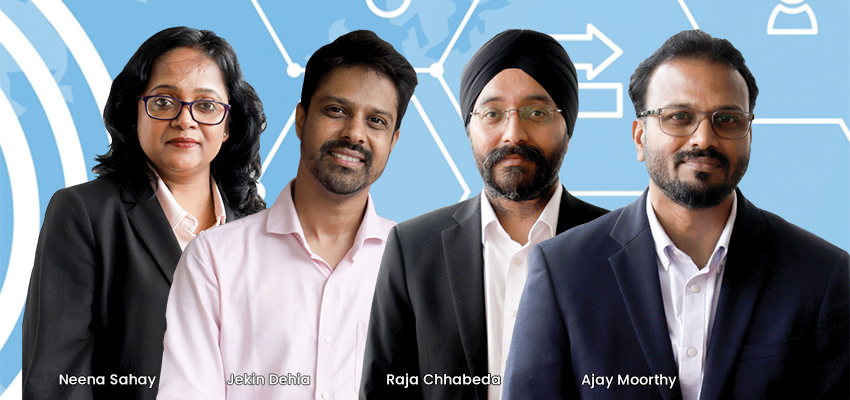
Panellists (L-R)
- Neena Sahay, General Manager, Sales and Marketing, AquaAIR Logistics Pvt. Ltd.
- Jekin Dehia, CTO & co-founder, Ease My Ai Pvt. Ltd.
- Raja Chhabeda, Head of Digital Engineering & Technology, Digital Health Alcon Vision
- Ajay Moorthy, Director, Procurement Services, WNS Procurement
(Session moderator: Vinita Deshmukh, Editor, Corporate Citizen)
Technology is transforming international business, and India has the potential to lead the world in the field of artificial intelligence (AI), opined the industry experts who participated in a panel discussion at the International Business Conclave 2024 held recently at Sri Balaji University, Pune (SBUP), on the topic ‘India Thriving in the Global Arena’ . The panellist discussed how AI, the Internet of Things (IoT) and blockchain, improve efficiency, transparency, and customer experience in different industries. They also shared their insights on the need for infrastructure development, data security, and workforce upskilling. Corporate Citizen brings you excerpts from the discussion
Vinita Deshmukh: How have technology and innovation significantly impacted global trade and international business for the competitive edge?
Raja Chhabeda: I will answer this question with a live example. Two years back, there was a ship that got stuck in the Panama Canal, and, that one ship, caused an overall global deficiency of many individual products. USA is one of our biggest markets. They have four big ports, so we try to divert all the systems from different places to those four ports. We found that none of the ports are connected by technology to any other, so every piece of information was on email. Hence, we are trying to connect every shipment with individual connectivity by using the Internet of Things (IoT), so we know where we stand and we can pass the message between different fields. By doing that, our backorder and the customer demand and experience don't get impacted. In turn, anytime if any person wants to place an order or wants to buy our product, they get it, irrespective of whether there is a jam in the Suez Canal, the Panama Canal, or in any other further destination. We use this technology to gain the competitive edge while still delivering the customer an excellent business experience.
Jekin Dehia: There are hundreds of systems in any industry, but none of the systems is connected to each other. On the other hand, there are hundred different vendors providing hundred different systems, but they were independent. So, we connect all the systems together and bring the data from cameras, audio devices, software, IoT sensors and so on, on a single platform. We process it using AI algorithms and convert it into actionable items such as triggering a simple boom barrier or sending a WhatsApp message to perform the complex task like creating an MIS system.
There are many problems on the ground which we don't know. For example, in the logistics industry, people are actually struggling a lot, but the quality of jobs can get much better. For instance, we went to Dhamra port in Odisha; they own 60 kms of railway line, and these railway tracks are maintained by 35 people who used to travel five kilometres every day just to manually check whether there is a defect in the track or not. Thus, we made an IoT device using two cameras by scanning the system in the train. Then we created a stimulus that detects the exact location of the defect, and that's how we automated the process.
Ajay Moorthy: I am from WNS Procurement—a business unit wherein we provide procurement outsourcing services to third-party clients. We help companies buy the material they need. Over the last couple of years, AI has touched every industry, and procurement is not an exception, and within that, the digital transformation of AI and generative AI has become huge. So, I'll just give a couple of examples of how these technologies have impacted procurement as a business.
Procurement is a fancy word for purchasing—we buy from different suppliers and follow the steps that one has to go through before making a buying decision. The first one is to find the source from where you want to buy something—so supplier identification is essential. With AI and GenAI in the mix today, that whole process wherein we used to have five or six people doing just supplier identification, has been totally automated. With GenAI, we have technologies that throw out a list of suppliers from where you can potentially buy that product or service. Likewise, the sourcing negotiations that you do with suppliers have changed dramatically over the last two years, given how the market has changed with digital interventions.
Neena Sahay: This digital world that we talk about has impacted and is going to impact further. Coming from the industry of logistics supply chain, it has impacted the functions enormously, right from the roots. Logistics is a very complex industry where different levels have different challenges that need to be addressed on a real-time basis where the modern internet revolution and digitalisation have come into play. AI of course, is a part of it. We have also come across a lot of challenges. A recent incident altered the entire aviation operation for a day and due to hacking. We had shipments which were to be handed over to the airlines, but our airline bills were stuck. This is what the impact of the digital world is in our business—because that day, after so many years, passengers and companies were given manual paper tickets and paper bills.
Q: How are traditional business models being disrupted across various industries such as hospitality, transportation, finance, pharmaceuticals, and healthcare. Can you provide some insights into these changes?
Raja Chhabeda: All of us probably once in our life might have gone to an optometrist to check our eyes. So first the optometrist checks your vision, and by making you read that wording and then decide what kind of lenses you need.
Now, if you look for apps as well as the technology availability, you can actually do that at your home. So, the part which optometrists used to play, is going to change drastically. They are no longer going to be consulted for vision correction.
Our company makes the equipment which is used for cataract surgery or LASIK surgery. So, 15-20 years ago, a cataract surgery used to take around 30 minutes. Now we perform it in seven minutes with security and precision.
Some of the technologies powered by AI are aiding us to live longer and healthier. For example, if a doctor is taking an X-ray to diagnose a specific disease, now in real time it can go and check similar x-rays that have been taken for the same demography of patients. Similarly, in the last 10 years, you have digitised data that can predict the possibility of getting a disease.
Jekin Dehia: As a part of my job role, I come across many problem statements in the industry. One of them pertains to Indus Towers—a company that builds mobile towers. When they installed mobile tower, they cut all the signals on that tower to charge it.
The issue we were facing was that people needed to climb the towers, which was highly risky. And, due to previous accidents, the client approached us, and we came up with a solution. We created a mixed reality experience room where trainees could actually feel as if they are climbing without the actual risk while undergoing training for climbing. Once they are confident, they can then climb the actual tower. So, the advent of technology has significantly improved safety, making human well-being the top priority.
"Block chain technology has a very important role in logistics and supply chain. Though in India, we have not started using it. However, we are using block chain widely for our customers offshore"
- Neena Sahay
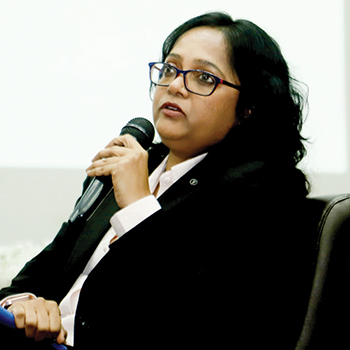
Ajay Moorthy: I'll touch upon its impact in the market on the negative side. The news about people getting laid off is in trend these days. In big multinational companies, most of that is happening because of this technological advancement. There is still uncertainty in the market about how GenAI, which is very new, is going to play a role in changing the dynamics of how businesses are run today. Therefore, all the companies, irrespective of the size, are treading very carefully. They are not splurging money the way they used to earlier, and before hiring someone, they think multiple times.
Now, with that being said, AI is not going to replace any of us completely. In our company at least, what we say is, whenever we take the name AI, we always hyphenate it along with human intelligence (HI), it's always AI-HI, a beautiful combination.
AI will take away some of the work that traditionally humans would have done. However, going forward, HI will help AI do a better job. Thus, before entering the market, you have to skill yourself up in this field so that you stay relevant and people see you as individuals who can trade and run AI technologies for their companies.
Neena Sahay: All industries have been touched upon by AI; it is here to stay, and certainly it has made a seismic move in our lives. It has significantly changed our lives. Gen Z, in particular, is heavily influenced by AI. Coming from that generation, I can see the difference AI has made in integrating with our lives; it is easing our lives in various ways. For example, AI has impacted the hospitality industry with services like Airbnb and has improved logistics by managing entry systems and saving electricity.
On the other hand, mobility has become more swift. With just the push of a button, we are getting all the services delivered. With these advancements, many people may not need to own a car as convenient services like Uber and Ola are available. These are all part of the technology and services which are coming up, adding ease to human life.
Q: Can you elaborate on how blockchain technology has improved transparency and facilitated quicker communication in global trade, particularly in preventing fraud and simplifying complex transactions?
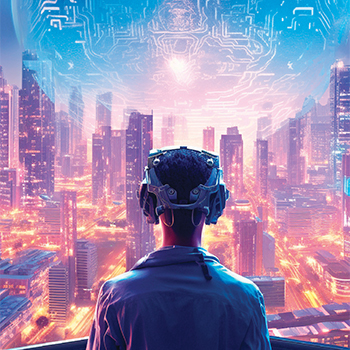
Raja Chhabeda: If you combine together the word digitalisation as well as the new stuff that is coming down—earlier, it was about digitisation, a process of making paper into a computer. And then it comes down to the next step, digitalisation, followed by blockchain.
I’ll explain it with an example. We do have many pharmaceuticals; we call them prescription products. Many countries around the world have a law that you must have to track and trace that product till its manufacturing, to avoid any kind of tampering or to avoid any kind of fake drugs that come into the market.
So, every time we manufacture any small 2 ml or 10 ml size of eye drops, we have to serialise it. After serialisation, we connect with the blockchain. We store that information in a blockchain that is connected to a government website, in which we generate a serialisation profile. These are all protected by blockchain. Thus, in every event, the product is going through packaging to end customer or to the receiver at the port so that they can validate whether this is the same serialised profile product. So, in the US we have the law where you should be able to validate by serial number and batch number of any of the prescription drugs to check whether this is a valid drug or not. This has changed the dynamics—we have the advanced tracking and traceability, and end-to-end visibility and transparency of the product since origin, till the consumer consumes it.
Jekin Dehia: I think blockchain technology is making a big impact on payment processing by enabling comprehensive tracking. The main idea of blockchain is to provide traceability for thorough monitoring. As a result, it can effectively address issues such as corruption. It is centralised and well organised, and combined with its traceable properties, it can significantly reduce such problems.
Ajay Moorthy: My two cents on technology would be that we do ethical sourcing in procurement. If a company is buying something from any supplier, it would want to make sure that it is using fair labour practices, such as not employing child labour or using sustainable materials for production. This is a big thing in the sourcing and procurement industry today. The blockchain technology is being used to ensure that the claims made by the seller are indeed true.
"Because I have faced a lot of challenges while implementing AI from our side, and actually it is not effective on the ground, in my opinion, basic training on following standard operating procedures (SOPs) should be provided to even unskilled labour "
-Jekin Dehia
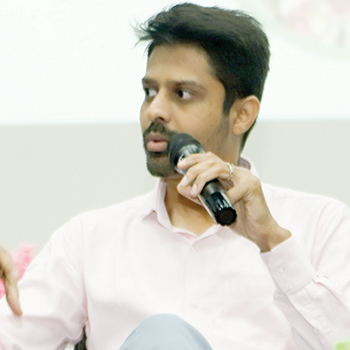
Again, the point about traceability is going all the way back to its origins and making sure that it goes through those steps till the time it ends up in the customer's hands. So, that's one area in my field where I see blockchain technology being used; quite a lot.
Neena Sahay: Block chain technology has a very important role in logistics and supply chain. Though in India, we have not started using it. However, we are using blockchain widely for our offshore customers in various countries like Egypt and Gabon, particularly African countries, the USA and South America.
Because now we are in a fragmented world-seeing a lot of war happening across the globe, which is impacting the global logistics significantly. And here comes the role of blockchain, to help the customers in a big way. The customers would want to know the status of the shipment, and it is very difficult for the end agents or the forwarding partners to make them understand that exact situation. With the help of blockchain, they are able to track and trace the shipments.
The other problem we face is payment. We also face a lot of difficulty when shipments are called but there are no takers, so the inventories lie at the shipment port for months. This is a cost to the shippers and cost to the shipment party, who pay for the goods, particularly perishable goods that cannot wait at the port for more than a day or two. So here again, blockchain is being introduced, though in India we are still to use it. Blockchain is certainly impacting the logistics field in a big way.
Q: At present where does India stand as far as AI is concerned? What is required to get it going at a faster pace, be it the management trying to open up their purses for it or the government’s support?
"India is helping us, especially in ophthalmology, as well as in the overall medical device industry. One of the fundamental things that India started a few years ago was the biometric ID, which is Aadhaar. Now, that started creating a foundation to digitise every person's profile in India"
-Raja Chhabeda
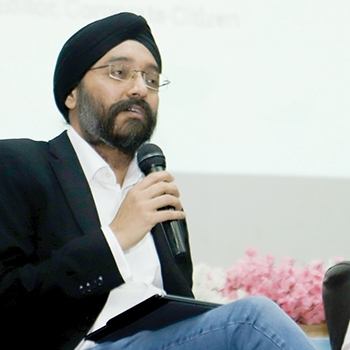
Raja Chhabeda: India is helping us, especially in ophthalmology, as well as in the overall medical device industry. One of the fundamental things that India started a few years ago was the biometric ID, which is Aadhaar. Now, that started creating a foundation to digitise every person's profile in India.
Around 1.4 billion people have their Aadhaar profile, which is digitised. Then there are tonnes of other initiatives, which are started, including the Ayushman Bharat—a scheme that provides insurance coverage to the needy. By creating this, India is sending a strong signal to the world that if we can do it for such a huge population in an easy way, we can also help solve the small problems across the world. I'll explain it with a recent example.
India’s more than 50% of generic drugs are manufactured out of India. More than 40% to 43% of vaccine supplies, especially for HIV and AIDS, are from out of India. So the dominance, or we call it a triumph, or the winning in the world, starts with building trust. So, can the world trust India? It shows in the last decade or two that India is showcasing that we have the youngest population with the core skill set of technology. For the AI or the next GenAI part, which is coming down, requires human intelligence and prompt engineering, and the largest source of skill sets is in India. So, the IT or AI services or AI outsourcing services are going to cost $200 billion in the next few years out of India, adding 7 per cent to your GDP. Thus, India has built that foundation, creating tall figures by doing multiple things. And, I'm pretty much sure that 20 years down the line, India, will contribute by providing the technological advancement with AI and next GenAI.
Jekin Dehia: As a part of the Skill India programme, every person in India is aware of what AI is and how to implement it. Because I have faced a lot of challenges while implementing AI from our side, and actually it is not effective on the ground, in my opinion, basic training on following standard operating procedures (SOPs) should be provided to even unskilled labour.
Further, AI is a very costly affair, so it is important to consider the cost of AI and its impact on problem-solving. People spending a lot on AI, need to think strategically about what impact they are creating. Moreover, there should be better communication between top-level management and the ground reality to make informed decisions.
Ajay Moorthy: I think none of us has to do anything for that to happen; it will happen automatically. It is coming at us fast. For example, if a feature is added to a mobile phone, in three to four months it has become old already, and now you're looking for something new. So, technology is different, and AI is going to fuel it even more.
India is already a hub for IT services, BPO services, and AI has proven it multiple times that we are able to bring the workforce that is needed for this area, not just for India but for the entire world. We are also capable of scaling anything to any size, and of course the political stability and everything lands itself very nicely for India to be the leader here. Whenever we talk about India, China is also referred to as a competitor, and I think that is changing dramatically as well. Companies across the world are looking at alternatives. And the only alternative to China is India, which is also going to help India as a country.
"AI is not going to replace any of us completely. In our company at least, what we say is, whenever we take the name AI, we always hyphenate it along with human intelligence (HI), it's always AI-HI, a beautiful combination"
-Ajay Moorthy
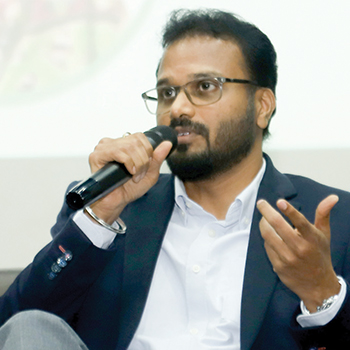
Neena Sahay: I would like to deviate a little bit. We have seen a lot of transformation since independence. I see India in that acceleration mode, which has already set in. We have also been a very huge exporter of services to the Western world. Now the world is looking at the potential in India—40 per cent of our population is young, and they are going to capture the world in the near future. We have already crossed the three-trillion economy, and we are the fifth economic power centre in the world. We are aiming to very soon surpass Germany and Japan to capture possibly the third position. From logistics perspectives, there are so many special economic zones (SEZ) being created in India. Now, we have more than 700 SEZs, which are catering to the requirements and needs of these industries. This has also given us momentum in the way we are progressing and the way we are doing our business.
If we have to stand tall in front of the global business, we need to be well-equipped and well-read, and we also have to deliver the services as per the requirement. Certainly, Digital India is doing so. The educational institutes today are equipping the young population with the right information and right education, so that we can go ahead and capture the world in the field of AI. India is playing a very important role, and it's definitely going to lead the world.